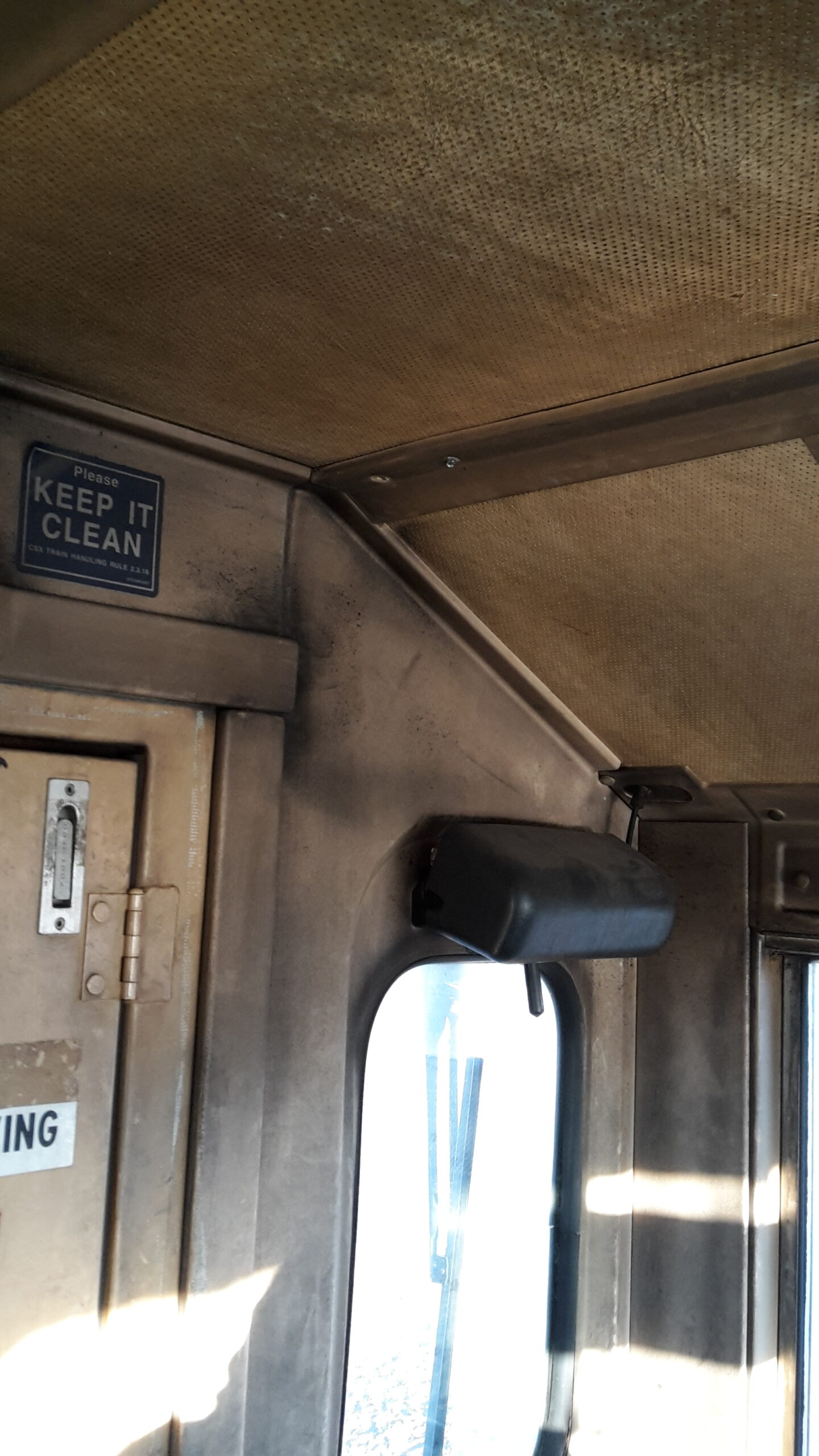Diesel Exhaust
What is diesel exhaust? Diesel exhaust is produced when engines burn diesel fuel. It’s a mixture of gases and fine particles, often referred to as soot, that includes over 40 toxic chemicals, such as benzene, arsenic, and formaldehyde.2 Many of these substances are either known or suspected to cause lung cancer.
What makes diesel exhaust so dangerous? Exposure to diesel exhaust irritates the lungs, damages cells, and over time, increases the risk of developing lung cancer. For railroad workers, the exposure to diesel exhaust is particularly concerning. The carcinogens in diesel exhaust adhere to the particles. In looking at photos showing soot-covered locomotive cab walls and ceilings, one former conductor asked:
“Is that what the inside of my lungs look like?”

It comes of little surprise that studies show that railroad workers have a 20% to 50% higher chance of developing lung cancer compared to the general population.3
How are railroad workers exposed to diesel exhaust? Railroad workers have been exposed to diesel exhaust since the industry transitioned from steam to diesel locomotives after World War II.4 Here are the primary ways they come into contact with these dangerous fumes:
Diesel-Powered Locomotives
- The main source of exposure comes from working with diesel-powered locomotives. Engineers and conductors are especially at risk, particularly when they’re riding on trailing locomotives, operating long-hood forward or traveling through tunnels. Diesel exhaust can seep into the cab through poorly-sealed windows and doors, electrical panels, and floor panels.
Maintenance Equipment
- Workers in the railroad track and engineering departments are also at risk. These workers are often near idling equipment, which releases diesel exhaust. In some cases, track workers have been exposed to fumes while working inside tunnels, where the exhaust accumulates.
Work Environments
- Diesel exhaust can build up in enclosed spaces, such as rail yards, repair shops, and tunnels. Workers in locomotive shops, in particular, face some of the highest levels of exposure. This is due to the common practice of idling and cold-starting locomotives inside roundhouses and diesel shops. In addition to locomotives, other equipment like torpedo heaters, cranes, and forklifts also contribute to the dangerous fumes in railroad shops.
How long have the railroads known diesel exhaust causes lung cancer? Despite knowing about the risks for over 50 years, many railroad companies failed to implement adequate safety measures. Here is a timeline of key discoveries and awareness:
1950s-1960s: Early Warnings About Diesel Exhaust Risks
- Diesel locomotives replaced steam engines in the U.S. railroad industry, exposing workers to high levels of diesel exhaust.
- 1955: Official records from the Association of American Railroads (AAR) indicate that the railroad industry was aware of the potential dangers of diesel exhaust to employees.
1970s: Growing Evidence of Health Risks
- 1977: The National Institute for Occupational Safety and Health (NIOSH) published a study identifying diesel exhaust as a potential occupational hazard.5
1980s: Stronger Links Between Diesel Exhaust and Lung Cancer
- 1987 & 1988: A group of researchers from Harvard University published two groundbreaking studies on lung cancer risk for railroad workers from diesel exhaust exposures.
- 1988: A study by NIOSH classified diesel exhaust as a “potential occupational carcinogen.”6
1990s: OSHA and Other Agencies Raise Alarms
- 1998: The California Environmental Protection Agency (CalEPA) officially classified diesel exhaust as a “toxic air contaminant” linked to lung cancer.7
- The Occupational Safety and Health Administration (OSHA) issued guidelines on diesel exhaust exposure, but railroad companies largely resisted strict regulations.8
2000s: Global Recognition of Diesel Exhaust as a Carcinogen
- 2002: The U.S. Environmental Protection Agency (EPA) officially recognized diesel particulate matter as a likely human carcinogen.9
- 2012: The International Agency for Research on Cancer (IARC), part of the World Health Organization (WHO), in part relying on the Harvard railroad worker studies from the 1980’s, finally classified diesel engine exhaust as **”carcinogenic to humans.10
Do you have legal options if you develop a diesel-related illness?
If you worked for the railroad and you have been diagnosed with a diesel-related cancer, you may have legal options. Under the Federal Employers’ Liability Act (FELA), railroad workers who have suffered occupational illnesses due to negligence may be entitled to compensation.
To learn whether you may have a FELA cancer claim against the railroad, call Hughes Law Offices today at 312-877-5588.
[1]https://www.cancer.org/cancer/types/lung-cancer/about/key-statistics.html
[2]https://www.cancer.org/cancer/risk-prevention/chemicals/diesel-exhaust-and-cancer.html
[3]https://www.cdc.gov/niosh/docs/2014-151/pdfs/chapters/chapter-dl.pdf [4]https://www.lungcancercenter.com/who-lung-cancer-affects/railroad-workers/
[5]https://www.iarc.who.int/wp-content/uploads/2018/07/pr213_E.pdf
[6]https://www.cancer.org/cancer/risk-prevention/chemicals/diesel-exhaust-and-cancer.html
[7]https://ww2.arb.ca.gov/sites/default/files/classic/toxics/dieseltac/staffrpt.pdf
[9]https://pmc.ncbi.nlm.nih.gov/articles/PMC3222501/
[10]https://www.iarc.who.int/wp-content/uploads/2018/07/pr213_E.pdf

